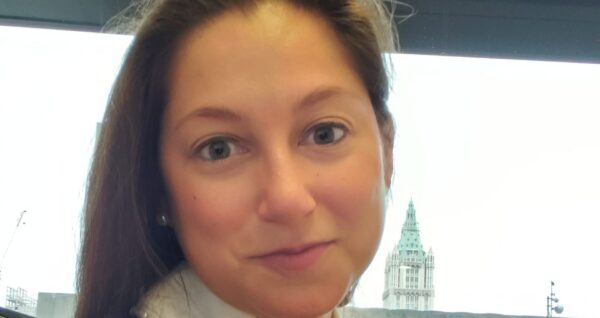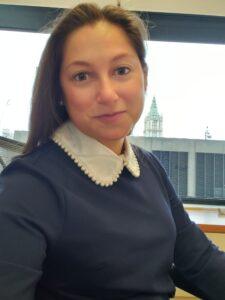At this year’s Above & Beyond Awards, Sanctuary for Families will be honoring Cleary Gottlieb associate and former Cleary Gottlieb Fellow Morton Bast for her trauma-informed advocacy in working with two survivors of domestic violence.
At this year’s Above & Beyond Awards, Sanctuary for Families will be honoring Cleary Gottlieb associate and former Cleary Gottlieb Fellow Morton Bast for her trauma-informed advocacy in working with two survivors of domestic violence. Morton worked with both clients for over a year, going so far as to take both cases with her back to Cleary Gottlieb in order to continue her legal representation from the firm.
In a previous Pro Bono Spotlight, Sanctuary for Families highlighted the work that Cleary associate Morton Bast did as a Cleary Gottlieb Fellow at Sanctuary. This groundbreaking new Fellowship placed Cleary associates full-time at legal services organizations for one full year, providing critically needed legal work to underserved communities during the pandemic while enabling Cleary Fellows to continue expanding their skill sets and pursue their specific interests. This year’s Above and Beyond Awards ceremony will honor Morton for the extensive work she did with two clients, Ms. D and Ms. O, both at Sanctuary and later at Cleary Gottlieb.
After being trained on how to approach trauma-informed, client-centered advocacy, Morton diligently and immediately set about putting these ideals into practice. Providing legal services to survivors of trauma, while extremely rewarding, of course, poses its own unique challenges, and Morton quickly learned that trauma can interfere with a person’s ability to recall details and to tell a coherent story of their experiences. One client, Ms. D, was deeply traumatized by her experiences of severe domestic violence and, as a result, extremely anxious about testifying in court – in addition to being extremely frustrated by over four years of litigation. Morton worked extensively with the client for hours at a time to gain her trust and prepare her for trial at her own pace.
“One of the major challenges of this case was that the client was not able to share her experiences in the typical structure of a direct examination, i.e. broken up into pieces in response to the attorney’s questions; she really needed to get into the zone and just deliver her story all at once. So rather than trying to force that, Morton and our team reconstructed the direct examination to allow the client to be the most comfortable telling her story on her own terms.”
Jennifer Friedman
Director of Sanctuary’s Bronx and Manhattan Legal Project
When Morton’s Fellowship at Sanctuary ended, she took Ms. D’s case with her back to Cleary Gottlieb. Ultimately, the case was settled at the eleventh hour on the morning that trial was scheduled with a highly favorable result for the client: an admission to domestic violence from the abuser and a 2-year Order of Protection, as well as consent to full legal and physical custody of the children. After this settlement, Morton stayed actively involved in the ongoing visitation case, which was also finally settled recently. Morton engaged in extensive negotiations with opposing counsel, drafted the final visitation stipulation, and was in constant communication with her client to ensure that the final visitation schedule was safe and enabled her to maintain her work schedule. Finally, after three and a half years of litigation, and Morton’s dedicated advocacy, Ms. D’s cases are resolved.
In Morton’s other major case, she drafted a motion for an extension of an Order of Protection for Ms. O, whose abuser, a convicted pedophile, was seeking visitation with their child. Morton, after leaving Sanctuary, continued on this case as well, successfully arguing the motion before the court in August and obtaining a final 2-year extension for the client.
In both the quality of her trauma-informed advocacy and her long-term dedication to her clients, Morton has truly gone above and beyond. Sanctuary is delighted to recognize Morton for her outstanding work on these cases.
Join us at our Above & Beyond Awards Ceremony on November 2, 2022, as we honor Morton and Cleary Gottlieb’s outstanding pro bono work.
If you can’t join us, but would like to support Sanctuary’s work, please consider making an Above & Beyond donation here.
Romy Felsen-Parsons is Pro Bono Project Assistant at Sanctuary for Families.




